Members of the 15th Cohort of ACE’s Internationalization Laboratory
met for their mid-term meeting last week in Washington, DC. The 11
members of the cohort reported on efforts to transform campus
internationalization during large and small group discussions and
networking sessions.
Or, as Lab Advisor Susan Carvalho put it, “The machine is built, now we’re greasing the working parts.”
Throughout the day, group discussions focused on the shared successes
and challenges institutions faced in the first several months of the
Lab process. Carvalho and fellow Lab Advisor Anthony Pinder both noted
the dynamism and energy among participants. Carvalho, however, cautioned
campuses not to lose this energy as they moved from the planning stage
to implementation.
Common successes further enthused the cohort members, who noted the
Lab process moving along well, high levels of engagement across
campuses, and a feeling of unification, as many participants found the
process has involved faculty and the local community, stakeholders not
typically involved in high-level conversations.
Pinder reminded participants to ask, “Whose help do you need?” when
evaluating which stakeholders can serve as advocates. David
Mothersbaugh, associate dean of undergraduate and international programs
at The University of Alabama, also offered advice to his fellow
participants, suggesting they have midterm reporting of results so they
do not fall behind—and also to remember that deadlines may fall through,
so plan ahead.
Participants also shared challenges, which included: feeling pressure
to live up to high campus expectations; time constraints; workflow and
communication between subcommittees and working groups; and getting
buy-in from stakeholders, especially senior leadership and faculty.
A shared challenge around communication sparked Lab Advisor McKenna
Brown to remind participants to pay attention to messaging. He
suggested, “Recalibrate messages to the community from ‘What can you do
for the initiative?’ to ‘What can this initiative do for you?’”
An afternoon session prompted participants to share where they are in
the Lab process. Some had just completed assembling task forces and
surveys; others are fine-tuning or even redefining internationalization
on their campus. To end the day, advisors helped participants address
next steps.

Internationalization Laboratory
Advisors, from left to right: Barbara Hill, Anthony Pinder, Gil Latz,
McKenna Brown, Susan Buck Sutton, Robin Matross Helms, and Susan
Carvalho.
Cohort 15 will meet for a closing seminar in November, where members
will wrap up nearly two years of collaboration and summarize their
findings.
Sarah Spreitzer, ACE’s director of government relations, also gave
Lab participants an overview of recent political developments that may
affect internationalization efforts, particularly Congress’ failure just the day before to pass common-sense, bipartisan legislation protecting Dreamers.
ACE’s Center for Internationalization and Global Engagement (CIGE)
is currently accepting applications for the 16th cohort of the
Laboratory, which will begin in August 2018 and conclude in April 2020.
Interested campuses should apply soon, as space is limited.
For more information, contact Robin Matross Helms, director, CIGE, at rhelms@acenet.edu.